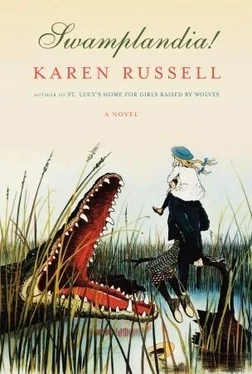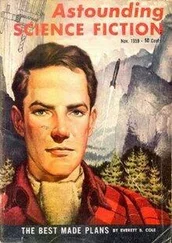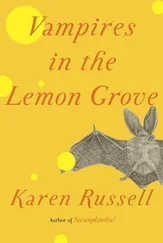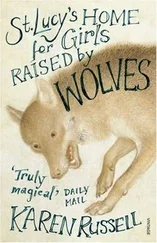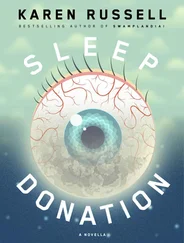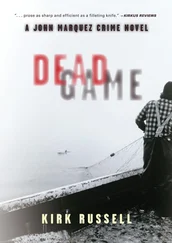“Ossie is sixteen now, Chief. We’re not babies.”
The Chief didn’t go into much detail about his upcoming mainland trip, but I understood that it had something to do with raising more capital for his Carnival Darwinism ideas. He was seeking investors. New partners. Men with the foresight to invest in our family’s evolution!
“We don’t have generations to wait around, try things out, see: Does it work? Is it a good adaptation? None of that bullshit, Ava. We want to get this thing done soon .”
“Okay, Dad. Sounds good.”
He was going to buy us adaptations: wings and goggled eyes, skin suits, new tridents for hooking Seths. The crocs in the Carolinas could be shipped to us by Christmas. Soon the indigenous Bigtrees would be able to compete with our niche competitor, that exotic invasive species of business, the World of Darkness.
I mentioned that he might run into Kiwi on the streets of downtown Loomis, and he looked up at me through a fog.
“What’s that now, Ava?” he bellowed across the carpet. Steam came dreaming up from the little ark of the iron.
“Who?”
The last tourist we ever had that summer came on a Friday in June, four days after Kiwi left our island. It was raining, and I barely remember what she looked like. I remember her running up the boardwalk, screaming, had we seen her hat? She was worried about missing the ferry back.
Some things you know right away to be final — when you lose your last baby tooth, or when you go to sleep for the ultimate time as a twelve-year-old on the night before your thirteenth birthday. Other times, you have to work out the milestone later via subtraction, a math you do to assign significance, like when I figured out that I’d just blown through my last-ever Wednesday with Mom on the day after she died. “We do not have your hat, ma’am,” the Chief apologized to this tourist, and she was very upset. She jogged back toward the ferry dock in a huff and I remember that as being one of the few times after the End had begun that I was glad to see a tourist go. Later we did find the hat, a crinkly pink-and-white-striped visor, mall-fancy from some chain haberdashery, and the Chief put it up for sale in our Bigtree Gift Shop for sixteen dollars, similarly ignorant of the fact that we were not going to have any more customers. We must’ve had a last customer make a last purchase in the gift shop and completely missed that milestone, too.
Nobody came the following day, or the day after, and a week later the Chief would “temporarily suspend” all Swamplandia! shows and activities in preparation for his business trip to Loomis County.
CHAPTER SIX. Kiwi’s Exile in the World of Darkness
Forty miles south and west of Swamplandia! as the crow flies, beyond the grid of Army Corps levees and drainage canals, across a triangle of new highways that slide over and under one another like snakes in a warren, was the parking lot of the Loomis World of Darkness, where Kiwi Bigtree sat on the burning hood of a powder blue Datsun and watched with an anthropologist’s prudish fascination as his new friend Vijay packed and smoked a bong. “Bong” was on a list of twenty-three new mainland vocabulary words that Kiwi had acquired just that week. “Dude, do you blaze?” asked dreamy-eyed Vijay. “You want a hit ?”
Kiwi shook his head. He did not. He did not think that he did. He watched Vijay’s work shirt contract, Vijay smiling with his eyes shut.
“Come on, Margaret Mead, get over here and do a hit with me! Seriously, bro, it trips me out when you just watch like that.”
“No thanks … Listen, please don’t call me that.”
He was trying very hard not to respond to Margaret, although since this was the only name by which his colleagues in the World of Darkness knew him, Kiwi worried that he might come across as a little aloof. Somebody, probably Vijay, had discovered a copy of Coming of Age in Samoa in Kiwi’s work locker and introduced the book as a break room conversation piece. It was Yvans, his Trinidadian coworker, who’d turned to the picture of a scowling Margaret Mead in her grass skirt and palm-leaf hood, kneeling between two Samoan girls with her field notes in hand, and had rechristened him as Margaret. Now everybody in the World knew him as Margaret or Margie Mead, although recently some of the girls had shortened this to M&M, a trend that Kiwi was trying to encourage. M&M was an improvement; M&M could stand for all kinds of mysterious things, much less emasculating things. Macho Macho? Maybe that was a little too on the nose, Kiwi conceded … The important thing here was that the abbreviation “M&M” didn’t automatically equate Kiwi Bigtree with the encyclopedia photograph that Yvans had taped above Kiwi’s locker of a middle-aged woman covering her breasts with jungle foliage.
Vijay was inhaling deeply and rhythmically; he was becoming a conscious participant in his own respiratory process, he said.
“Say what you will about our shitty jobs, Margine,” Vijay said, exhaling, “but at least the World’s got air-conditioning …”
The World of Darkness got shortened to “the World”—as in: “Hey, Kiwi, hook me up! Clock me out of the World, yeah?” and “What do you fools want to do when we get out of the World ?” Everybody did this, Kiwi included, although to Kiwi the abbreviation felt dangerous; there was something insidious about it, the way it crept into your speech and replaced the older, vaster meanings. “The World” now signified a labyrinth of depressing stucco buildings that fed into a freezing airplane hangar. Neon tubing and the vaulted roof of the Leviathan made the place feel modern, but when the lights came on after hours, Kiwi had the same melancholy feeling that used to strike him when he waded ankle-deep into the pulpy napkins and Styrofoam cups that littered the stadium floor on Swamplandia! The owners of this franchise of the World of Darkness had filled the hangar with evil rides, evil water fountains, smoke machines, and unconvincing robots. Kiwi got paid $5.75 an hour to work as part of an army of teenage janitors. Park greeters, security officers, customer service reps, costumers, janitors: all of them pimpled gum chewers, deodorized for war. There were plenty of adults, too, but the worst work seemed to be reserved for the youngest summertime employees.
That morning Kiwi had aced his first test, the New Employee Quiz. You could use your employee manual to look up an answer if you forgot it, said the proctor, his manager, Carl. Kiwi was disconcerted to find that many of these questions were worded like unfunny knock-knock jokes:
Q: What do you call a guest to the World of Darkness?
A: A “Lost Soul.”
Q: What maneuver should you perform during a Choking Incident?
A: The Heimlich Maneuver.
The other choices had been “A Naval Maneuver,” “The Hoover Maneuver,” or “No Maneuver.”
Kiwi had been pushing brooms in the World for weeks now, and the only other employee besides Vijay with whom he’d become friendly was Yvans Parmasad, a Trinidadian man with Tabasco-red veins in his eyes and so many young children that he often got their names confused. (“Bum me some money, Kiwi, today it is … Tam’s birthday.”) Their friendship commenced when Yvans pointed out to Kiwi a particular Lost Soul — a stunning woman on crutches in a red sundress, Kiwi’s age — and then very casually proceeded to detail the things he would like to do to her in bed, in a Jacuzzi, after a lobster dinner, on his Camaro’s hood …
“Wouldn’t that be extremely hot, Yvans?” Kiwi was thinking about the thermal conductivity of metal, the insulation of her crutches …
“Yes!” Yvans clapped his hands, the first person on the mainland to acknowledge Kiwi’s genius. “Hot, that it would be! Kiwi, I’m saying it but you’re thinking it, am I right?!”
Читать дальше
